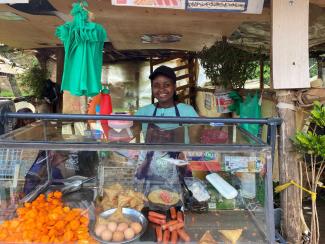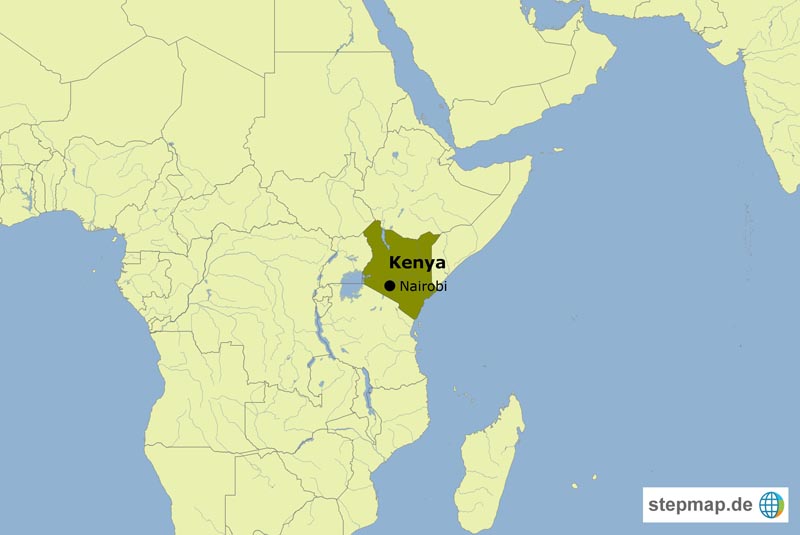Informal sector
“Normally I don't really take a break”

This article is part of an interview series about people working in the informal sector in different countries, including a motorcycle taxi driver in Uganda, a domestic worker in India, a refugee teacher from South Sudan, a fish butcher in Mexico and a head porter in Ghana.
Who are you?
My name is Lucy, I am 29 years old, and I am a food vendor. I have a small stall where I sell snacks, mainly samosas, sausages, eggs and bhajia, which are spiced potatoes. I started seven years ago with a small handcart, and now I have expanded to a wooden stall with a signboard, some space to sit and a place to cook during the day. I am the owner of my stall and have an employee – a sister of mine who helps me. This is also her permanent workplace.
Where do you live?
I live right here on the street, not far from my stand. It’s a one-bedroom flat that I share with my husband, our little daughter and another sister, my little sister.
What does your average day look like?
I get up at four in the morning, say my prayers and then start preparing my ingredients for the samosas. I cook the green grams and potatoes. That takes about four hours. By nine o’clock, I’m ready to start my work at the stall. Normally I don’t really take a break. I close my shop around ten o’clock in the evening, so I’m home by ten thirty at the latest. After dinner is ready, I take a shower and go to sleep. Sometimes I eat dinner myself, sometimes I just prepare it for the others. I work every day except Saturdays, and on Sundays I get up two hours later. That means I don’t open until eleven o’clock on Sundays.
What do you like about your situation?
I chose this job because people eat food every day. It’s not like selling clothes, people don’t need new clothes every day. And most people like snacks, like sausages or eggs. Especially where I am located – my stall is near a university and the students are my main customers. And I really enjoy cooking.
I make enough money to live on. Sometimes I make a loss, but most of the time I make a profit. I can’t complain. My husband is a motorbike rider, so my income is a bit more stable.
What I don’t like is getting up so early – but that’s necessary to maximise the income. There’s also a lot of competition in this field. And if the university is closed for three months, I have to close too. Without the students, the business is not viable. So, I’m thinking about opening something small elsewhere – if my funds allow.
How can your situation be improved?
The government doesn’t recognise us hustlers, street vendors. The city council comes and harasses us, they want us to pay taxes even though they know we can’t really afford it. I pay some taxes, but they come and want more. They just take a lot of money.
Then they force us to have a business licence and health insurance. That’s the right thing to do, but none of us have the money for all these things. But at least I have health insurance. I pay into the state insurance scheme.
This harassment needs to stop, and it needs to be replaced with more support and recognition from the government. Insurance should be largely free, and permits and other things shouldn’t be so expensive if they want us to pay taxes.
And if a fire were to break out here, everything would burn down. My stand is made of wood. The government wouldn’t pay compensation and the insurance isn’t affordable. There was an attempt to set up a savings and credit co-operative to insure us among us vendors, so to speak, but the initiators eventually abandoned it. But that would be something that would also improve our situation. It’s just that nobody has the time or the energy to try again.
Katharina Wilhelm Otieno belongs to the editorial team of D+C/E+Z and works from Nairobi at times.
euz.editor@dandc.eu










